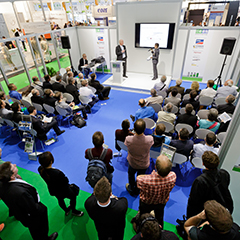Small, large, mobile, stationary: ees presented the entire value-added chain of innovative energy storage technology over three days
Munich, June 11, 2014 – This year for the first time, the electrical energy storage (ees) international exhibition for batteries, energy storage and innovative production took place in conjunction with Intersolar Europe. The launch was a complete success and exhibitors were delighted with the outcome. Around 250 companies presented products, solutions and services for state-of-the-art energy storage systems at ees and Intersolar Europe. Together, Intersolar Europe and ees form the world’s largest industry platform for storage systems presented in combination with photovoltaics solutions. Around 800 visitors attended presentations at the ees forum in hall B1 of the exhibition. One of the forum’s highlight was the International Battery and Energy Storage Alliance (IBESA) Executive Panel on energy storage systems and photovoltaics. The electrical energy storage (ees) AWARD was also presented for the first time to showcase outstanding so-lutions in the area of energy storage. The ees exhibition was accompanied by seven ees sessions at the Intersolar Europe Conference dedicated to energy storage.
Energy storage is one of the most important elements needed to decouple the generation of solar power from consumption and take the load off the power grids. This makes energy storage systems a promising growth market as well as an indispensable part of a successful energy transition. A total of 250 companies presented products, solutions and services for state-of-the-art energy storage systems at ees and Intersolar Europe 2014. Around 50 ees exhibitors showcased a wide range of energy storage solutions – ranging from individual components and production to specific examples of application – and all were pleased with the outcome. Dr. Andreas Gutsch, Competence E Coordinator at Karlsruhe Institute of Technology (KIT), Eggenstein-Leopoldshafen, Germany, commented: “We were overwhelmed by the response to our participation. We had excellent conversations and are already planning to come back next year.” Dr. Stephan Göttke, Managing Director Finance of E3/DC GmbH from Osnabrück, Germany, was also pleased with how the exhibition went: “ees has been very successful and positive for us, mainly because we were able to forge many good contacts. The visitors to our booth were well informed and had extensive experience and excellent technical know-how.”
A host of innovative technologies
Battery storage systems that use state-of-the-art lithium-ion cell technologies were among the most prominent of the many technologies and solutions presented at ees. Most of them focused on increasing the share of on-site consumption by combining PV with intelligent load management, such as self-learning control algorithms. Grid management functions are also on the rise, while another trend favors larger storage units which can develop or support stand-alone grids when combined with other power generators. These can be used for the electrification of rural, off-grid areas. In addition to ensuring that power will continue to be supplied without interruption, larger units help to stabilize the grid and ease peak loads for industry and commerce. Light was also shed on long-term storage systems that use power-to-gas solutions in combination with biogas power stations and hydrogen technology.
Excellent response to ees forum
One of the highlights of ees this year was the ees forum in hall B1, which was co-organized by the International Battery and Energy Storage Alliance (IBESA) and the Battery University. Over three exhibition days, more than 34 experts spoke about storage solutions for energy systems with a high share of renewable energy, covering current market developments as well as new technologies and future scenarios. The forum’s highlight was the IBESA Executive Panel on Energy Storage and Photovoltaics, which shed light on recent developments in the German and European industries. The panelists were Josef Feilmeier, Managing Director at Fenecon GmbH & Co. KG (Deggendorf, Germany), Markus A. W.Hoehner, founder and Managing Director of IBESA – International Battery and Energy Storage Alliance (Bonn, Germany), Joachim Simonis, Head of Sales and Marketing at Leclanché S.A. (Yverdon-les-Bains, Switzerland), Christoph Ostermann, Chief Executive Officer at Sonnenbatterie GmbH (Wildpoldsried, Germany) and Dr. Matthias Vetter, Head of Department, PV Off-Grid, Solutions & Battery System Technology at Fraunhofer Institute for Solar Energy Systems ISE (Freiburg, Germany). The Executive Panel discussion centered around the development and viability of storage incentives in Germany.



























